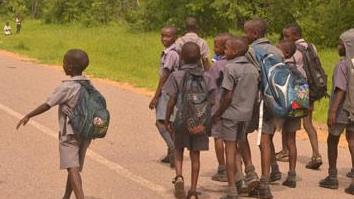
HUNGER has taken its toll at Mzinyathini High School in Matabeleland South where students are reportedly fainting en masse after attending classes on empty stomachs coupled with walking long distances to school.
The affected students are mostly day scholars who come from places surrounding Mzinyathini as they walk long distances to school without having meals. Most of the students have been forced to drop out of school because of starvation.
Gift Dube, one of the parents in the area, told Sunday Southern Eye that the situation was worrisome as children were failing to complete their studies.
These revelations are disturbing particularly coming on the backcloth of assurances from the powers-that-be that no one will die of hunger.
President Robert Mugabe and Zanu PF assured the nation that no one would starve, promising the electorate ahead of the July 31 polls his new government would move with speed to dole out food to needy members of the community.
People were told the country had ordered 150 000 tonnes of maize from Zambia to feed the starving masses. But more than 100 days in office, Mugabe’s new administration is facing a situation where pupils are fainting in class due to hunger blamed on drought and poor agriculture policies.
Independent reports from humanitarian agencies indicate more than 2,2 million people are in urgent need of food aid and this probably includes the students fainting due to hunger at Mzinyathini High School where this newspaper reported recently that the food handouts were being politicised.
The government (read Zanu PF) should move with speed to avert imminent deaths of students at the school by delivering on its elections promises. If it has no capacity, it should swallow its pride and admit that Team Zanu PF has taken the nation for a ride and ask the international community to chip in and take over the distribution of food aid.
- Chamisa under fire over US$120K donation
- Mavhunga puts DeMbare into Chibuku quarterfinals
- Pension funds bet on Cabora Bassa oilfields
- Councils defy govt fire tender directive
Keep Reading
The clarion call is that the government should save the children who are being forced to drop out of school due to hunger.
The situation at Mzinyathini High School is probably playing out in other drought-hit areas of southern Zimbabwe which are reeling from the ravages of drought.
We call upon the government to consider introducing feeding schemes at schools, including urban areas which have not been spared from the serious food shortages. Food relief programmes should prioritise schools particularly in the southern parts of the country.










